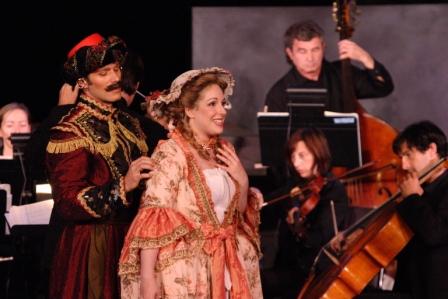Cosí Fan Tutte: the delight of seeing music made

Vancouver: The UBC opera ensemble (students or recent graduates of the UBC opera program) sing Mozart’s Cosí Fan Tutte - a presentation of Bard on the Beach's Opera and Arias program - with irreverent glee. These folks know their business, and Bard’s mainstage theatre is the perfect place to see Mozart’s upbeat opera, since compared to many opera venues it is intimate, as eighteenth century theatres generally were, and the audience can connect more easily with the performers.
It’s also a great place to go for a first opera experience, since audience members need not shell out a week’s pay to attend. Walking in and seeing the sold-out house and the small orchestra set up on the round raised main stage, my heart lifted, and it just kind of kept going up when the singers began.
Cosí Fan Tutte is all about the beautiful music. Particularly gorgeous on opening night was the trio “Soave sia il vento,” in which the young ladies say good-bye to their lovers. Throughout, the major pleasure is in hearing the singers’ voices play with each other and with the orchestra. Having the orchestra on stage, with the singers appearing both above them and in front of them, increases this pleasure by adding a visual element to the instrumental music (I particularly enjoyed watching the typanist, tucked into an archway on the left) as well as to the singing.
The plot seems designed to manufacture some emotions to sing about without doing any real harm to its characters. Briefly: Ferrando and Guglielmo declare that they have the loveliest and best and most faithful fiancées in all the world. Don Alfonso, “a middle-aged cynic,” argues that they cannot trust their women. To test this theory, the young men pretend to be called off to war, then come back disguised as Albanians and woo each others’ ladies. With the help of the witty maid, Despina, sung with verve and sass by Sylvia Szadovzski, the young men are, of course, successful in getting marriage promises and tokens of love from the young ladies.
Everything turns out fine in the end, but first the disillusioned young men sing with Don Alfonso “Cosí fan tutte,” standing up on the raised back of the stage above the orchestra like out-of-work Greek prophets and pointing accusingly into the audience. Which of course is totally unfair because the men betrayed their ladies first, and if anything it should be “cosí fan tutti” (thus do all people) not “cosí fan tutte” (thus do all women), and those young men are just lucky that nobody died while they were playing their war games, and that the flame of jealousy was never really lit (for plots where this same kind of bragging and testing goes horribly wrong, see the story of the curious impertinent one in Cervante’s Don Quixote, or Shakespeare’s Cymbeline, for starters). But I digress. This production managed to convey the silliness both of the young men’s righteousness and the ladies’ quickly refocused sentimentality.
Jose Anton (Don Alfonso) provided a strong anchor to the opening scene, the first trio, and throughout, with his expansive dramatic presence and his rich, steady, expressive voice. Connor Beaton (Guglielmo)’s baritone voice shone in his love songs, especially the duet in II.iv, while Martin Sadd’s polished tenor suited the bold Ferrando. Margo Lavae (Fiordiligi, a.k.a. fickle maiden #1) and Leah Field (Dorabella, a.k.a. fickle maiden #2), both accomplished singers, played their ridiculous characters with goofy abandon (what else could they do?), flouncing around in their long dresses and throwing themselves on the stage as needed. Lavae pouted so that her lips almost flapped, halfway between irate three year old and anxious hall monitor, while Field leered sweetly through her blonde curls. Lavae’s clear soprano and Field’s richer mezzosoprano voice worked well together—the duet “prenderò quel brunettino” where they decide which of the Albanian suitors each will have was lovely and lots of fun. Lavae handled the difficult “Come Scolio” aria well, and Field’s ease on stage and her warm voice made her performance particularly appealing. While the performers’ laughter, sobs, and gestures were stylized (and at times the singers allowed the music to displace their bodies as if they were Saturday morning cartoons), as their emotions modulated into song they became moving.
At the movies, in coffee shops, in elevators, at the grocery store, we hear music. It is a delight to see it being made.
Opera & Arias: Così fan tutte, a speical event production of Bard on the Beach continues on September 7 & 8. For more information go off in a disguise here.



